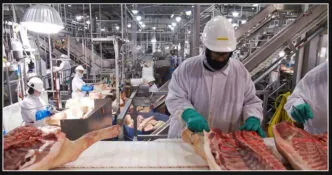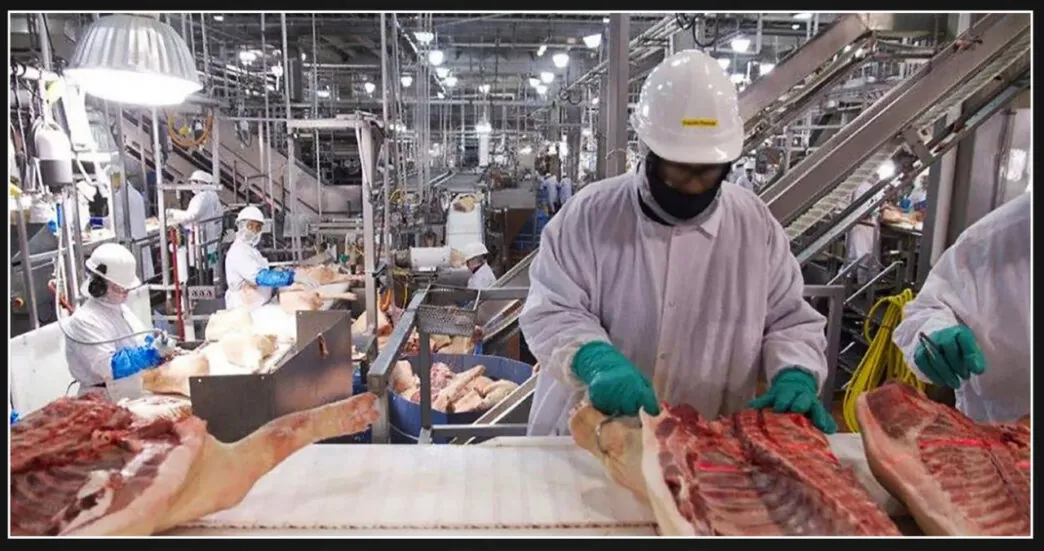Raising cattle can be a challenging endeavor. Kansas ranchers and feedlot operators face numerous obstacles on a daily basis, including drought, disease, and blizzards. However, the most significant issue they constantly contend with is the shortage of labor. This problem is particularly prevalent in southwest Kansas.
Micheal Feltman, an immigration attorney in Cimarron, Kansas, just west of Dodge City, emphasized the vital role of immigrants in the functioning of various establishments. According to him, without their assistance, these operations would not be able to operate effectively.
Feltman assists the feedlots and mega dairy farms in the vicinity in recruiting workers. According to him, individuals from over 40 countries who migrate to southwest Kansas play a vital role in sustaining the beef industry and the local economy.
Close to half of the individuals involved in meat processing in the United States hail from foreign countries. Immigrants play a pivotal role in the labor force responsible for feeding and caring for animals. While a majority of these workers have legal status, a considerable portion remains undocumented. Furthermore, documented immigrants often provide financial support to immediate family members residing with them unlawfully.
President-elect Donald Trump’s promises of a comprehensive crackdown on immigration, including sealing the border and deporting 11 million individuals, have caused great concern within the meat industry.
Mass deportations in the meat industry would have far-reaching consequences, according to Feltman. The already understaffed processing plants would face significant slowdowns, resulting in meat shortages and potential price spikes for consumers. Additionally, farmers would be burdened with excess livestock that they could neither sell nor adequately care for, leading to a sharp decline in the value of their animals.
According to Feltman, if all the immigrants who have come to the town in the past two decades were to suddenly disappear, the town would be like a ghost town. He believes that the businesses in the area would struggle to survive without the contributions and presence of these immigrants.
The beef industry runs on imported labor
For a recent Haitian immigrant, who wishes to remain anonymous due to the immense hardships she faced in her home country, the situation feels like a matter of life and death. Alongside her 4-year-old daughter, she arrived in Garden City just three months ago. They are currently residing under temporary humanitarian parole, which grants them a two-year window to pursue asylum.
She is currently awaiting the approval of her work permit. However, she expressed her readiness to take on any type of labor, even the hazardous, uncomfortable, and unpleasant tasks at the Tyson packing plant located on the outskirts of town. With the assistance of an interpreter, she explained that she is strictly abiding by the regulations to remain in the United States. She has a scheduled appointment for a screening process, which is expected to pave the way for her work visa and ultimately grant her financial autonomy.
She expressed her happiness and stated, “Investing in the country would bring me immense joy because I have the responsibility of taking care of my child and myself.”
She now has a fear that due to Trump’s rhetoric during the election and after, she might be sent back to the violent chaos in Haiti instead of being able to contribute to a workforce that is in desperate need of her skills.
“It’s not safe,” she warned. “The gangs are taking lives.”
The meat processing industry is facing a significant challenge in finding enough native-born workers to fill the demanding and labor-intensive roles, despite offering generous salary increases in recent years. Employers in regions like southwest Kansas are struggling to attract reliable individuals who are willing to perform the challenging and dirty tasks required in this sector.
The immigration system is incredibly complex and fails to admit a sufficient number of legal immigrants to meet the demand. As a result, many companies resort to hiring undocumented workers as a means of coping with this shortage.
According to Jada Thompson, an economist at the University of Arkansas, the issue would only worsen with mass deportations, as it would have a ripple effect throughout the meat supply chain. One of the main consequences would be the slowdown of meat-packing plants, leading to shortages in the market.
Thompson predicts that retail customers will experience an increase in prices.
According to her, farmers will not benefit from the increasing retail prices as there will be an excess of animals in the system. This surplus is growing every day as more pigs and cows reach maturity, making it difficult for meat processors to utilize them effectively.
Thompson believes that farmers will eventually see lower prices as a result of oversupply. He explains that farmers simply cannot harvest a large number of animals, leading to an excess in the market.
According to Thompson, a similar situation occurred a few years ago, but it wasn’t due to an immigration crackdown. Instead, it was caused by the COVID pandemic.
Thompson inquired about the consequences within the supply chain, questioning, “And what happened in that supply chain?” He highlighted the adverse impact, stating, “It backed it up. Prices went up. All of a sudden, you had people with pigs and cows that could not go to market because there was nowhere for them to be slaughtered.”
Farmers were faced with a difficult predicament – they still had to provide food and shelter for their animals, but the demand for meat had plummeted. As a result, these farmers found themselves in a situation where they were spending extra money each day to keep more pigs and cows alive, without any hope of selling them. The financial burden became too great for some farmers, forcing them to make the heart-wrenching decision to shoot their livestock and bury them. It was a lose-lose situation for everyone involved.
According to Glynn Tonsor, an economist at Kansas State University, the negative impacts of such losses would be felt across the various towns in southwest Kansas. These towns heavily rely on large feedlots, dairies, and packing houses.
According to Tonsor, local businesses often serve as major employers and contribute significantly to local tax revenue. This has significant implications for the funding of public institutions such as schools and libraries. The funding of these facilities heavily relies on the success and growth of these businesses within the community.
Kansas Livestock Association CEO, Matt Teagarden, expresses his hope that the Trump administration’s deportations, if they occur, proceed slowly and find a way to protect the meat industry, which heavily relies on immigrant workers.
Teagarden expressed his belief that border security should be strengthened, but he advocates for a streamlined process in granting work visas instead of restricting it. He emphasizes the need to either import people or import food to address the labor shortage issue.
Teagarden emphasized that one of the options available is to shift our food production to other countries if we fail to maintain a sufficient workforce. He pointed out that without the required workforce, we would not be able to meet the daily, weekly, and monthly demands for food. As a result, food production would be outsourced to other locations.














